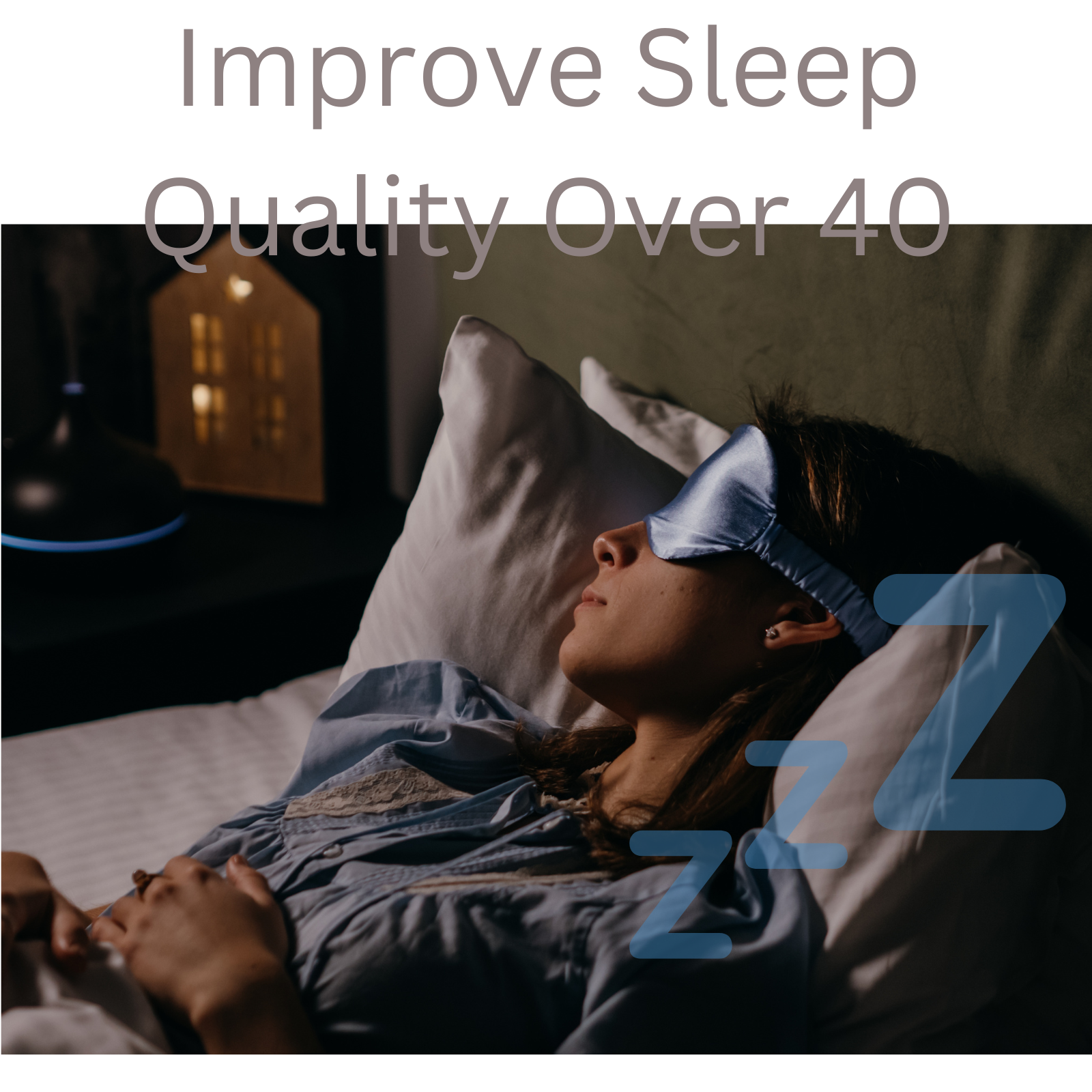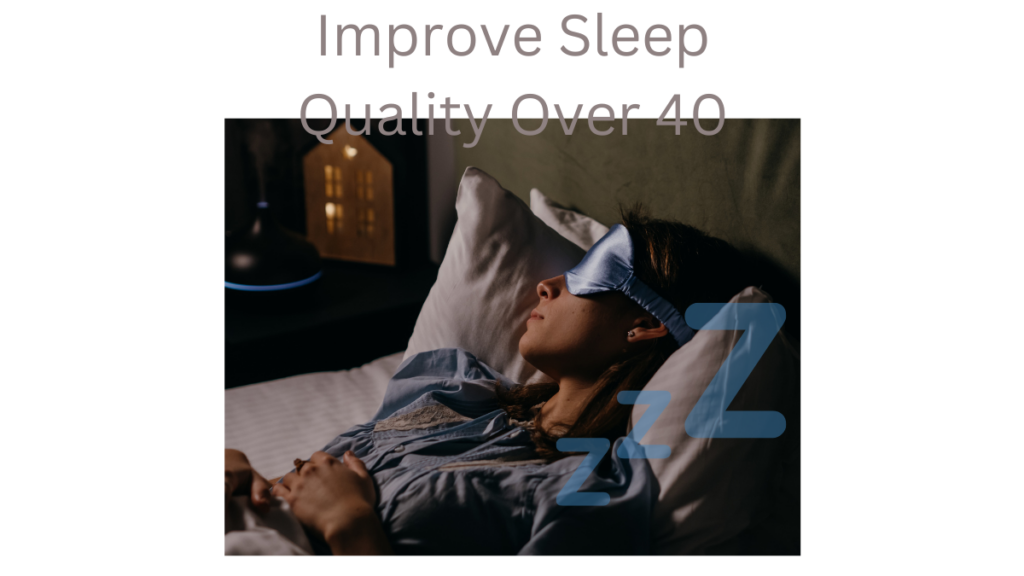
How To Improve Sleep Quality Over 40
Introduction

How To Improve Sleep Quality Over 40
Today we will go over How To Improve Sleep Quality Over 40. Over the years and as you age your quality of sleep tends to go down. There’s a lot of factors that go into effect and cause this to happen and today we will be going through and providing a summary of the latest studies on the topic. I will also give you my perspective and how it has affected me personally and what I’ve done to improve it.
This does not work for everyone as we all are unique individuals with different biochemistry, lifestyle and health condition but I think it represents a good percentage of the average person over 40 years old.
One thing I want to say here is that I’m not a health care professional and I’m not qualified to give you medical advice anything that you read here is merely an aggregate of online studies and my personal experience. Having said that lets just dive into it.
How To Improve Sleep Quality Over 40
There are a number of things that people can do to improve their sleep quality as they age. In this section I will give you a very high level overview of methods to improve your sleep quality if you are over 40 and later in the article we will go over the details.
- One of the most important things is to maintain a regular sleep schedule. This means going to bed and waking up at the same time each day, even on weekends.
- Avoid caffeine and alcohol before bed, as these can interfere with sleep.
- Another important thing to do is to create a comfortable sleep environment. This means keeping the bedroom dark, quiet, and cool.
- Avoid working or using electronic devices in bed. Instead, they should use the bedroom for sleep and sex only.
- Finally practice some relaxation techniques before bed. This can include reading, taking a bath, or doing some light stretching. By following these tips, people can improve their sleep quality as they age.
So now that you got the quick summary if you want to keep reading I will go into more details.
How To Establish A Regular Sleep Schedule
There are many benefits to establishing a regular sleep schedule. Getting enough sleep is important for overall health and well-being. It can help improve mood, increase energy levels, and promote better mental and physical health.
A regular sleep schedule can also help you get a good night’s sleep. It can make it easier to fall asleep and stay asleep. When you have a regular sleep schedule, your body gets used to sleeping at certain times. This can help you feel more rested and less likely to wake up during the night.
If you’re having trouble sleeping, establish a regular sleep schedule. Go to bed and wake up at the same time each day. Avoid caffeine and alcohol before bed. Create a relaxing bedtime routine. And make sure your bedroom is dark, quiet, and cool.
How To Create A Bedtime Routine
There’s nothing quite like winding down at the end of a long day with a relaxing bedtime routine. For me, that means taking a warm bath, reading a few pages of my favorite book, and writing in my journal. I find that taking some time for myself before bed helps me to sleep better and wake up feeling refreshed.
If you’re looking to create a relaxing bedtime routine of your own, here are a few ideas to get you started:
1. Take a warm bath or shower.
2. Read a few pages of a book or magazine.
3. Write in a journal.
4. Stretch or do some light yoga.
5. Listen to calming music or an audio book.
6. Diffuse lavender essential oil.
7. Drink chamomile tea or valerian root tea.
8. Practice deep breathing exercises.
9. Visualize a peaceful scene.
10. Say a positive affirmation to yourself.
How To Create An Ideal Sleep Environment
To keep a cool, comfortable environment in your bedroom, there are a few things you can do.
- First, make sure to keep the blinds or curtains closed during the day to block out the sun.
- Second, use a fan to circulate the air and keep the room cool.
- Third, keep the door to your bedroom closed to keep the cool air in and the warm air out.
- Finally, if you have an air conditioner, use it to keep the room at a comfortable temperature. By following these tips, you can ensure that your bedroom is a cool and comfortable oasis.
- Add some white noise to your room that may help take away some noise from outside. I like the natural rain monitor, typically you can find those online in stores or you can download an app for your phone.
How Good Hygeine And Room Setup Improves Sleep
There are many things you can do to promote good sleep hygiene, but one of the most important is to use comfortable bedding. This means finding sheets and blankets that are soft and inviting, and that won’t make you too hot or too cold during the night. It’s also important to have a pillow that supports your head and neck in a comfortable way.
Once you’ve found bedding that you love, it’s important to take care of it. This means washing it regularly in order to keep it clean and fresh. It’s also a good idea to invest in a mattress protector, which will help extend the life of your mattress and keep it free of dust and other allergens.
By taking these simple steps, you can create a sleeping environment that is conducive to good sleep hygiene. And when you get a good night’s sleep, you’ll be able to enjoy all the benefits that come with it, including improved mood, increased energy, and better overall health.
I also like to use pillows and mattress made from natural elements such as coconut, palm leaves and other material. Those are generally a little more expensive but they are worth the price difference to come as close to nature as possible. Furthermore this kind of bedding tends to me more breathable and allows your pores to get more air, I found a lot of improvement since I started introducing them. If you can’t find those at least go with pure cotton bedding. At all costs try to avoid elastic bedding unless off course you have allergies and want to block off mites.
This leads me to my next point which is if you have allergies keep your bedding as clean as possible as dust mites may cause difficulty breathing for you. The other option is to use special hypoallergenic bedding to help you prevent them from surfacing. Note this isn’t a solution off course you will still need to do some work and keep them clean.
Limit Your Light Exposure Before Bed Time
There are a few reasons why you might want to limit your exposure to light in the evening hours.
- One reason is that light can interfere with your body’s natural sleep cycle. If you’re trying to go to bed at a reasonable hour, you don’t want to be exposed to bright lights that will keep you awake.
- Another reason is that too much light exposure can be bad for your eyes. If you’re looking at screens all day, your eyes can get tired and strained. Too much light exposure in the evening can make it harder to fall asleep and can also lead to headaches.
- Generally light is associated with tablets, displays or activity and all those are very disruptive to you sleep so make sure you mute all those light devices in your room so it can enter a proper sleep cycle.
Avoid Stimulants Before Sleep
Stimulants such as caffeine can have a negative impact on our sleep. Caffeine is a stimulant that can keep us awake and make it difficult to fall asleep. If we drink caffeine before bed, we may find ourselves tossing and turning all night long. In addition, caffeine can also disrupt our sleep patterns and cause us to wake up feeling tired and groggy. To avoid these problems, it is best to avoid stimulants such as caffeine before bedtime.
In contrast if you found yourself having too caffeine during the day try to take some chamomile or valerian root combined with melatonin to counter the effects of caffeine. Also remember that caffeine is not only in coffee it exists in energy drinks, tea, pills, pre-workout supplements and other drinks. These have the same effect on your body messing with your sleep cycle.
Conclusion
If you enjoyed How To Improve Sleep Quality Over 40 and would like to drop me a cheer below I would really appreciate it.
What is your favorite part of your sleep routine?
I have also written some similar articles which you may find interested listed below:
You may find some studies I cited when writing this article here:
You may also like

What Percent of Adults Can Bench 315

How Long Can the Average Person Sprint For

Does Lifting Weights Make your Hands Stronger
Archives
- February 2026
- January 2026
- December 2025
- November 2025
- October 2025
- September 2025
- August 2025
- July 2025
- June 2025
- May 2025
- April 2025
- March 2025
- February 2025
- January 2024
- October 2023
- September 2023
- August 2023
- July 2023
- June 2023
- May 2023
- April 2023
- March 2023
- February 2023
- January 2023
- December 2022
- November 2022
- October 2022
- September 2022
- August 2022
- June 2022
- May 2022
- April 2022
- March 2022
- January 2022
- December 2021
- November 2021
- October 2021
- August 2021
- November 2020
- July 2020
- May 2020
- April 2020
- March 2020
- August 2018
- July 2018
- June 2018
- April 2018
- March 2018
Categories
- Aftercare Procedures
- Age Groups
- AI/ML
- Alternative Medicine
- Ambient Computing
- Animal Health
- Animal Husbandry
- Animals
- Anti-Aging
- Architectural Design
- Art And Technology
- Auditory Science
- Augmented Reality
- Automation
- Babies
- Baby
- Beauty & Skincare
- Beauty Industry
- Biohacking
- Biomechanics
- Book Reviews
- Breastfeeding
- Budgeting
- Budgeting Strategies
- Business
- Cardiovascular Health
- Career Advice
- Career Development
- Career Growth
- Cats
- Chess
- Chronobeauty
- Circular Economy
- Civic Technology
- Cleaning Tips
- Cloud Computing
- Cognitive Health
- Cognitive Performance
- Cognitive Science
- Community
- Community Building
- Community Engagement
- Community Living
- Computer Vision
- Consumer Guides
- Consumer Trends
- Container Gardening
- Content Analysis
- Content Non-Technical
- Content Strategy
- Cooking Techniques
- Cosmetic Chemistry
- Cultural Events
- Cycling
- Data Analysis
- Data Engineering
- Data Science
- Database
- Design Psychology
- Design Trends
- Developer Productivity
- Diet
- Diet
- Diet And Nutrition
- Digital Identity
- Digital Media
- Digital Wellbeing
- DIY
- DIY Projects
- Dogs
- Engineering Culture
- Entertainment News
- Environmental Impact
- Environmental Science
- Equity Compensation
- Ethical AI
- Exercise
- Exercise Science
- Exercise Technique
- Exotic Pets
- Fall Gardening
- Family
- Family Health
- Family Life
- Fashion Business
- Fashion Industry
- Fashion News
- Fashion Tech
- Financial Analysis
- Financial Optimization
- Financial Planning
- Flooring Maintenance
- Food
- Food Psychology
- Food Safety
- Food Science
- Food Tech
- Functional Fitness
- Functional Training
- Future Of Work
- Garden Care
- Garden Maintenance
- Gardening Tips
- Geospatial Data
- Gig Economy
- Greece
- Greek
- Greek Food
- Green Technology
- Gymnastics
- Hardware Engineering
- Health
- Health And Wellness
- Health Informatics
- Health Science
- Health Tech
- Health Technology
- Healthcare
- Healthcare Management
- Healthy Eating
- Healthy Recipes
- Holistic Health
- Holistic Wellness
- Home & Living
- Home Decor
- Home Financing
- Home Health
- Home Improvement
- Home Maintenance
- Home Organization
- Home Styling
- Horticulture
- Household Chemistry
- Identity Management
- Indoor Gardening
- Industrial Design
- Industry Analysis
- Infant Nutrition
- Infrastructure Management
- Ingredient Deep Dive
- Integrative Health
- Integrative Medicine
- Interior Design
- Internet of Things
- Internet of Things (IoT)
- Invalid Request
- Investment Strategies
- Investment Strategy
- IoT
- Kids
- Leadership Development
- Learning Strategies
- Lifestyle
- Lifestyle Brands
- Lifestyle News
- Lifestyle Optimization
- Literary Criticism
- Literature
- Logistics Management
- Material Science
- Materials Science
- Meal Planning
- Media Analysis
- Meditation
- Mental Health
- Mental Performance
- Mental Wellness
- Miami
- Miami Food
- Mind And Body
- Minimalism
- Mobile Development
- Neuroscience
- No Applicable Categories
- Nursing
- Nutrition
- Nutrition News
- Open Source
- Operating Systems
- Operational Resilience
- Opinion
- Organization Tips
- Outdoor Living
- Over 40
- Over 50
- Over 60
- Parenting
- Parenting
- Parenting Strategies
- Performance
- Performance Optimization
- Personal Development
- Personal Finance
- Personal Growth
- Personal Productivity
- Pet Care
- Pet Safety
- Philosophy
- Plant Care
- Politics
- Product Formulation
- Productivity
- Productivity Engineering
- Protein
- Psychology
- Psychology of Space
- Quantified Self
- Reading Culture
- Real Estate Investment
- Recipes
- Regulatory Compliance
- Remote Work
- Renovation Planning
- Resource Management
- Respiratory Health
- Responsible Pet Ownership
- Retail Strategy
- Retail Technology
- Robotics
- Science
- Seafood
- Seasonal Gardening
- Security
- Sedentary Health
- Self-Care
- Skincare Science
- Skincare Trends
- Sleep
- Sleep Health
- Smart Home
- Smoothies
- Social Impact
- Soft Skills
- Soil Health
- Spatial Computing
- Spatial Design
- Stress Management
- Supplements
- Sustainability
- Sustainability Science
- Sustainable Engineering
- Sustainable Fashion
- Systems Engineering
- Tax Optimization
- Tax Strategy
- Tech Investment
- Technical Writing
- Testing
- Travel
- Travel News
- Travel Safety
- Travel Tips
- Trend Analysis
- Tropical Plants
- Uncategorized
- Urban Gardening
- Urban Planning
- User Experience
- Veggie
- Vietnam
- Virtual Events
- Volunteering
- Wealth Management
- Wearable Technology
- Wellness
- Wellness Technology
- Winter Gardening
- Work-Life Balance
- Workplace Culture
- Workspace Setup
- World
- Writing
- Writing Skills
- Year In Review
- Yoga
- Yoga News
- Zero Waste
